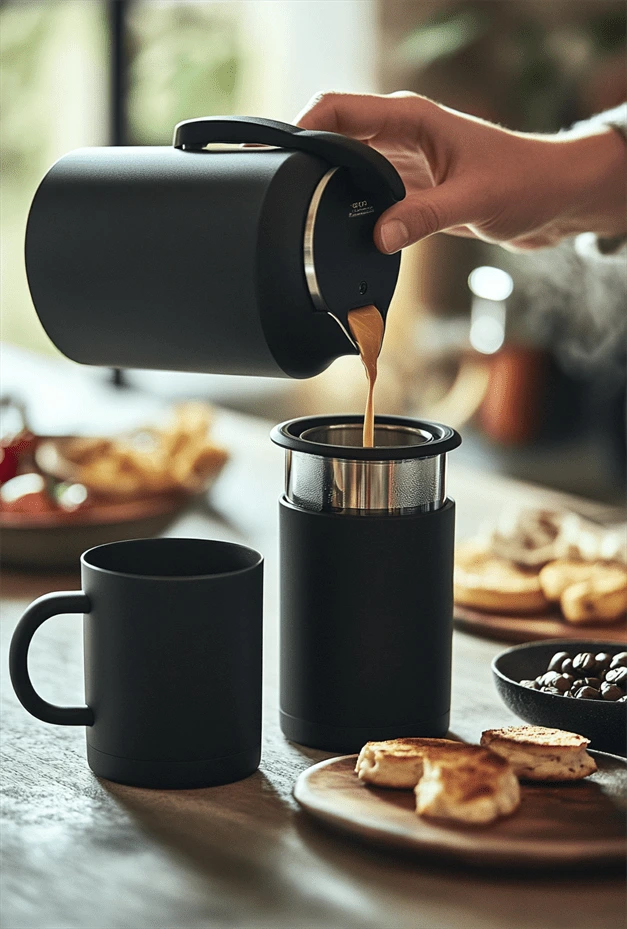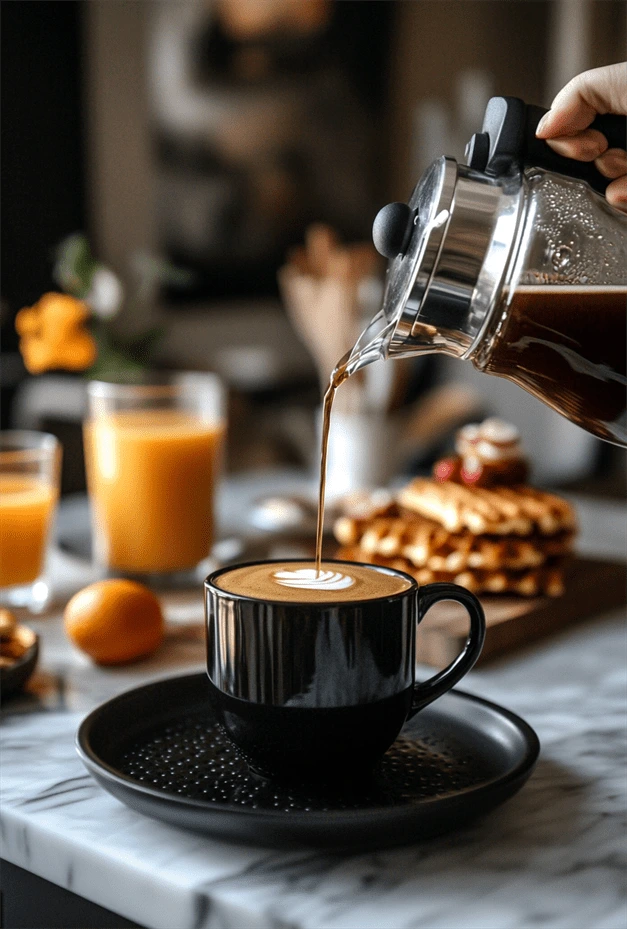French Press Coffee Ratio – Perfect Your Brew Every Time
Table of Contents
✍️ Introduction: A Writer’s Morning Begins with Balance ????????
Some mornings need poetry. Others need caffeine. And then there are the best mornings—when the two become one. ☕????
As a public writer, I know that great writing starts with great brewing. That’s why the French press holds a sacred place on my kitchen counter. But behind every rich, bold cup lies one simple truth:
“It’s all in the ratio.”
Too weak, and it’s just brown water. Too strong, and your tongue rebels. But with the perfect French press coffee ratio, you hit that harmonious note where flavor, aroma, and strength unite. ????????

⚖️ What Is the Ideal French Press Coffee Ratio?
The golden ratio for French press is:
???? 1:15 — 1 gram of coffee for every 15 grams (or mL) of water
That means for 1 liter of water, you’ll use around 66 grams of coffee.
???? General Rule:
1 tablespoon of ground coffee ≈ 6 grams
☕ French Press Coffee Ratio Chart (Quick Reference)
| Cups of Coffee | Water (ml) | Ground Coffee (g) | Ground Coffee (Tbsp) |
|---|---|---|---|
| 1 cup | 250 ml | 16–17 g | ~2.5 tbsp |
| 2 cups | 500 ml | 33 g | ~5.5 tbsp |
| 3 cups | 750 ml | 50 g | ~8 tbsp |
| 4 cups | 1000 ml | 66 g | ~11 tbsp |
| 8 cups | 2000 ml | 132 g | ~22 tbsp |
☕ Always adjust based on your preferred strength—lighter roast? Add more grams. Stronger cup? Slightly less water.
???? Why the Ratio Matters (And How It Affects Your Brew)
| Ratio Type | Flavor Outcome ???? | Use When… |
|---|---|---|
| 1:12 (Strong) | Bold, rich, almost espresso-like | You need a strong wake-up call ☀️ |
| 1:15 (Balanced) | Full-bodied yet smooth | Daily sipping, perfect balance ????♂️ |
| 1:18 (Light) | Gentle, subtle flavors | Evening brews or light roasts ???? |
The ratio determines extraction strength—that is, how much flavor is pulled from the grounds into your cup.
???? Brewing French Press in 6 Simple Steps
- Boil water to 200°F (just below boiling).
- Grind coffee coarsely – like breadcrumbs.
- Add coffee grounds to the French press.
- Pour hot water evenly over the grounds.
- Stir gently, then place the lid on top.
- Brew for 4 minutes, then slowly press down.
????️ Let it rest 30 seconds before pouring—to reduce bitterness and allow flavors to bloom.
???? Pro Tip: Use a Kitchen Scale
???????? Most baristas recommend using a digital scale instead of scoops or spoons. Why?
- More accurate = better control ????
- Consistent results every time ????
- Easier adjustments when scaling up or down ????
????️ Recommended Coffee for French Press
| Roast Type | Flavor Notes ???? | Works Well With… ☕ |
|---|---|---|
| Medium Roast | Chocolatey, nutty, balanced | Breakfast blends, Colombian beans |
| Dark Roast | Smoky, bold, earthy | Italian roast, Sumatra |
| Light Roast | Floral, citrus, tea-like | African single origin |
⛔ Avoid espresso grind! Too fine = muddy and over-extracted.
???? Why French Press Is Still the Writer’s Favorite
- No electricity required
- Rich oils preserved (no paper filters)
- Slow, mindful process
- Easy to clean
- Affordable – quality models under $50
Whether you’re crafting stories or sipping in silence, the French press offers presence, aroma, and depth—all brewed through simple science.
???? Ideal Audience for This Content
- Coffee beginners learning ratios and technique
- Minimalist brewers avoiding machines and pods
- Writers and creatives seeking routine and ritual
- Sustainable sippers reducing waste and plastic
- French press fans upgrading their method
???? Final Thoughts: Balance Is a Brewed Art ????♀️☕
In writing, as in coffee, balance is everything.
The French press reminds us to slow down, measure thoughtfully, and appreciate depth—whether in the beans or in the words we write. It’s not just about caffeine—it’s about connection. ????✨
So tomorrow morning, before the rush of notifications or the hum of daily duty, pause. Measure. Pour. Wait. Sip.
And know that with the right French press coffee ratio, you’re not just brewing—you’re becoming. ☕????️

